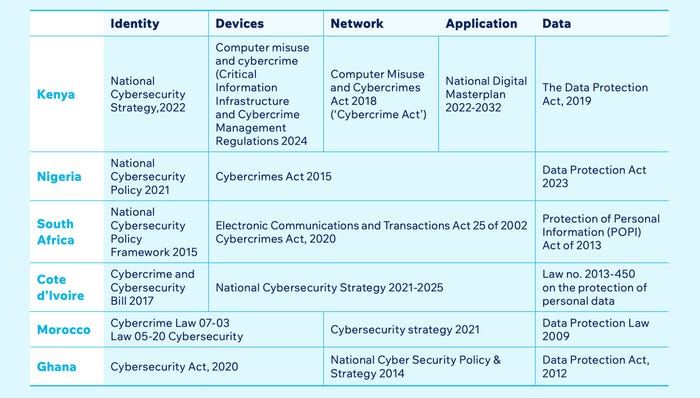As Africa experiences quick financial development, cybercrime seems to be preserving tempo.
In 2023, for instance, the common variety of weekly cyberattacks impacting African companies grew 23% in comparison with the prior years, the quickest enhance worldwide, in keeping with Interpol’s 2024 African Cyberthreat Evaluation, with ransomware and enterprise electronic mail compromise (BEC) topping the record of great threats. Digital illiteracy, ageing infrastructure, and a scarcity of safety professionals all current challenges to stopping financial loss resulting from cybercrime, in keeping with a report published last month by Entry Partnership and the Centre for Human Rights on the College of Pretoria.
Because the continent’s gross home product (GDP) grows to an estimated $4 trillion by 2027, cyberattacks and cybercrime represent a major drag on financial improvement, and African nations have to speed up their coaching of cybersecurity expertise, says Nicole Isaac, vp of worldwide public coverage for expertise large Cisco.
“Africa faces probably the most vital impression from cyber threats in comparison with every other continent,” she says, including “almost [all] monetary leaders in Africa contemplate cybercrime a major menace together with macroeconomic situations and political and social instability.”
At present, Africa accounts for eleven of the world’s top-20 quickest rising economies, with Niger, Senegal, and Libya main the area’s sturdy economies with development charges of at the very least 7.9%, according to the African Development Bank Group. South Africa, Nigeria, and Egypt are the three largest economies within the area, however none have signed the Malabo Conference, the cybercrime protocols put ahead by the African Union.
South Africa, for one, has seen cybercrime price the financial system round 2.2 billion Rand per 12 months (US $123 million), a lot of it made attainable by the overall lack of cyber-safety data, says Heinrich Bohlmann, affiliate professor within the Division of Economics on the College of Pretoria in South Africa.
Cybercrime is commonly the results of customers at dwelling and at work being unaware of cyber dangers and scams, he says. “They too simply click on or reply to issues they should not, and within the office, this may, in fact, have large repercussions for companies.”
A Instructing Second
The rising price of cybercrime needs to be thought-about an opportunity, particularly as Africa embarks on its digital transformation. Whereas many western and Asian populations are ageing quickly, Africa is seen as a supply of younger, tech-savvy employees sooner or later, who shall be properly located to make use of new applied sciences, akin to AI for enterprise and to enhance cybersecurity.
African nations should advance shortly and develop collaborative relationships simply as quick, says Caroline Parker, managing director in FTI Consulting’s South Africa monetary communications observe.
“It’s important that governments put the requisite guardrails in place by growing strong regulatory frameworks to reinforce cybersecurity greatest observe,” she says. “This can’t be an remoted response from particular person governments given how transportable the issue is throughout borders, subsequently, harmonization of requirements and rules is required on a regional foundation.”

Cybersecurity coverage protections by a collection of African nations. Supply: Elevating Africa’s Cyber Resilience report
AI may assist carry quite a lot of modifications to Africa, with the financial worth of AI in sub-Saharan Africa anticipated to create greater than US $130 billion in development, in keeping with Entry Partnership and the College of Pretoria’s “Elevating Africa’s Cyber Resilience” report. AI has the potential to empower under-represented teams, offering them with the talents and alternatives wanted to soundly take part within the digital financial system, Cisco’s Isaac says.
“AI methods can considerably improve human capabilities in menace detection and incident response via machine studying and deep studying strategies,” she says. “They will additionally simplify cybersecurity operations by automating routine duties akin to malware detection and vulnerability evaluation.”
Want for Higher Cybercrime Knowledge
The stories and estimates additionally underscore the necessity for higher knowledge on the issue of cybercrime, as present estimates usually wouldn’t have supporting proof and look like overinflated. For instance, one knowledge level within the “Elevating Africa’s Cyber Resilience” report posits that cybercrime will price African economies 10% of GDP. The UN Financial Fee of Africa cites the ten% determine as properly. Neither report has supporting knowledge.
In actuality the price is probably going 30 instances much less. Estimates of the price of cybercrime in Africa usually differ between $4 billion and $10 billion per 12 months. With the present GDP of Africa estimated at $2.81 trillion by the International Monetary Fund, the most important price of cybercrime finally ends up round 0.3% of GDP.
The information actually has not been well-explored, says the College of Pretoria’s Bohlmann.
“For Africa as an entire, [the cost] may very well be something,” he says. “Nonetheless, the ten% of GDP equating to US $4.12 billion is clearly a typo or mistake.”







